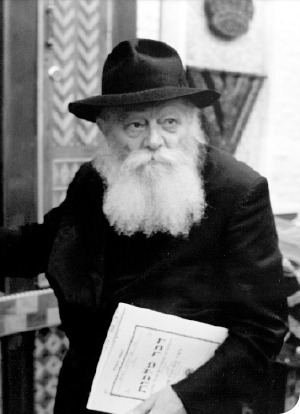BASI L’GANI – 5718 –
Beis Moshiach presents the maamer the Rebbe MH”M delivered on Yud-Alef Shvat 5718, in accordance with the custom established by the Rebbe to review each year a section of the Rebbe Rayatz’s hemshech “Basi L’Gani” of 5710. • This year we focus on the eighth section of the profound and foundational Chassidic discourse. * Final Instalment.
Translated by Boruch Merkur
 LIKE A MONKEY BEFORE MAN
LIKE A MONKEY BEFORE MAN
7. The above discussion pertains to the aspect of “be’er – well,” spelled with an Alef (Beis-Alef-Reish), whereas “bor – pit,” spelled with a Vav (Beis-Vav-Reish), is described in Torah as being “empty”: “the pit was empty (v’ha’bor reik); there was no water in it.” Because of the [unholy] letters Reish-Kuf [which spell “reik – empty”], “there was no water in it.” Thus, our Sages say, “‘There was no water in it’ – but there were snakes and scorpions in it,” meaning that falling short in one’s avoda results in the empowerment of klipos and Sitra Achara. Symbolic of this syphoning of energy to the unholy realm is the elongated left side of the Kuf, whose “legs descend into death” [as discussed above].
This concept is also expressed in the saying, “k’kof bifnei adam – like a monkey before a man” (or “like a monkey compared to a man”; see Zohar II 148b): Although there is thought, speech, and action in the realm of klipa, and it imitates k’dusha, it is just [a simulacrum] “like a monkey before a man.” The true expression of thought, speech, and action is in k’dusha, which corresponds to “man.”
The Hebrew word for “man” is “adam,” spelled Alef-Daled-Mem, or Alef with the word “dahm” (“blood,” spelled Daled-Mem) (Shla 21a). “Dahm” is an acronym for “dibbur u’maaseh – speech and action,” and the Alef represents thought (see Likkutei Torah B’Haalos’cha 31c). It is thought that energizes “dahm” – speech and action.
Now, this explanation – that thought stands on its own and speech and action share a commonality – does not contradict what was explained above regarding “af asisiv” (Section 4) – that it is action that is separate from speech and thought, which are grouped together. The perspective depends on whether we are considering how the soul’s garments compare to the soul itself or how they compare to each other, as follows.
The Rebbe Rashab, nishmaso Eden, explains that thought is united with the soul, in the sense that thought is private and involves introspection, knowledge of self, of the soul. Speech, on the other hand, is described as being separate from the soul as it is the sharing of ideas with another [someone who is external to one’s identity, outside the consciousness of the soul].
There is, however, an advantage to speech when compared to how action connects with the soul, for it is one’s thought that he communicates in speech, or at least what he has thought of in the past [thought being intimately connected to the soul, as above]. Speech therefore unites with the soul in the sense that it cleaves to the soul [in this manner, through thought]. Thus, in contrast to action, speech is unique to humankind, being only comprehensible to man.
Action, however, the garment of the soul that is totally separate from it, is not unique to man, nor is it limited to just man and animals (see Section 4); the power of action impacts even the mineral kingdom, such as when raw material is manipulated by a craftsman to form an artifact.
Thus, when the garments of the soul are considered unto themselves, compared to one another – that is, after they have already emerged from the soul [taking the soul out of the equation] – then action is separate whereas speech is “dabuk,” it “cleaves” to the soul. That is the perspective that emerged above in the discussion of “af asisiv.”
However, when the garments are considered in terms of how they relate to the soul itself, then thought [which is private, personal] is seen as being united with the soul and not an innovation and addition to the soul. Speech, on the other hand, is an innovation to the soul, for speech is the concept of revealing to another. Speech is predicated by the notion that another bears significance to the person, whereas, when considering the soul unto itself, others are irrelevant. For this reason, speech is irrelevant to the soul in this sense, for speech is all about communicating with another; speech is an innovation (as is action).
Thus, the word “adam,” being composed of the letter Alef and the word “dahm,” signifies thought, speech, and action as they are in the realm of holiness, whereas the thought, speech, and action of the unholy realm – their imitation of holiness is like “a monkey before man.”
POWER GRANTED BY THE REBBE
8. The Mishkan was constructed from krashim, wooden planks, to allude to the ultimate purpose of the service in the Mishkan: to transform darkness into light. The power granted to accomplish this transformation is the avoda of tzaddikim, especially N’siei Yisroel (the Rebbeim) of each and every generation, including the leader of our generation, the baal ha’hilula. It is the Rebbe who empowers all of his adherents and those who are associated with him to perform the avoda of iskafia and is’hapcha of Sitra Achara. Through this avoda, the glory of the Alm-ghty is exalted in all the worlds. “Basi l’gani,” the return of the Sh’china to the physical world, is thereby achieved as it was before the sin of eating from the Tree of Knowledge. In fact, an even higher revelation of G-dliness is reached, to the extent that the ultimate purpose for the creation of the world is fulfilled – “G-d desired to have a dwelling place in the lower realms.”
 January 16, 2018
January 16, 2018
Reader Comments